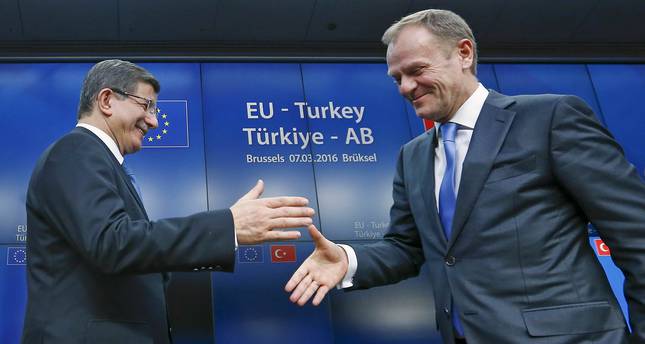In the early hours of Tuesday March 08,2016, Donald Tusk, head of the European
Council, emerged after 12 hours of talks with EU leaders in Brussels to announce a ''breakthrough '' in tackling Europe's Refugee Crisis “The days of irregular migration to Europe are over,” he said.
Turkish Prime Minister Ahmet Davutoglu (L) shakes hands with European Council President Donald Tusk

The deal with Turkey, spearheaded by German Chancellor Angela Merkel and Turkish Prime Minister Ahmet Davutoglu at the EU summit in Brussels, aims to restore order by halting chaotic illegal migration in exchange for a system of quotas to relocate people to Europe in an orderly fashion
The deal quickly ran into controversy over a plan to forcibly return those arriving in Greece on rubber dinghies, sending them straight back to Turkey. For every Syrian returned to Turkey, Europe would resettle one Syrian already living in Turkey. Those who attempted the illegal crossing would be sent to the “back of the queue”.
The pushback against the proposal was led by the UN, which warned that it could violate international and European law to return vulnerable people to Turkey, where some nationalities lacked legal protection. Filippo Grandi, the UN High Commissioner for Refugees, said: “I am deeply concerned about any arrangement that would involve the blanket return of anyone from one country to another without spelling out the refugee protection safeguards under international law.”
Amnesty International said that the mass return of people would be a “death blow to the right to seek asylum” and described the proposals as “alarmingly short-sighted and inhumane”. The group pointed out that the arrangement “would make every resettlement place offered to a Syrian in the EU contingent upon another Syrian risking their life by embarking on the deadly sea route to Greece”.
Note
The EU has so far pledged a funding of 3 billion euros ($3.3 billion) to Turkey that is home to 2.75 million refugees chiefly from neighboring Syria
Turkish Prime Minister Ahmet Davutoglu (L) shakes hands with European Council President Donald Tusk

The deal with Turkey, spearheaded by German Chancellor Angela Merkel and Turkish Prime Minister Ahmet Davutoglu at the EU summit in Brussels, aims to restore order by halting chaotic illegal migration in exchange for a system of quotas to relocate people to Europe in an orderly fashion
The deal quickly ran into controversy over a plan to forcibly return those arriving in Greece on rubber dinghies, sending them straight back to Turkey. For every Syrian returned to Turkey, Europe would resettle one Syrian already living in Turkey. Those who attempted the illegal crossing would be sent to the “back of the queue”.
The pushback against the proposal was led by the UN, which warned that it could violate international and European law to return vulnerable people to Turkey, where some nationalities lacked legal protection. Filippo Grandi, the UN High Commissioner for Refugees, said: “I am deeply concerned about any arrangement that would involve the blanket return of anyone from one country to another without spelling out the refugee protection safeguards under international law.”
Amnesty International said that the mass return of people would be a “death blow to the right to seek asylum” and described the proposals as “alarmingly short-sighted and inhumane”. The group pointed out that the arrangement “would make every resettlement place offered to a Syrian in the EU contingent upon another Syrian risking their life by embarking on the deadly sea route to Greece”.
Note
The EU has so far pledged a funding of 3 billion euros ($3.3 billion) to Turkey that is home to 2.75 million refugees chiefly from neighboring Syria
No comments:
Post a Comment